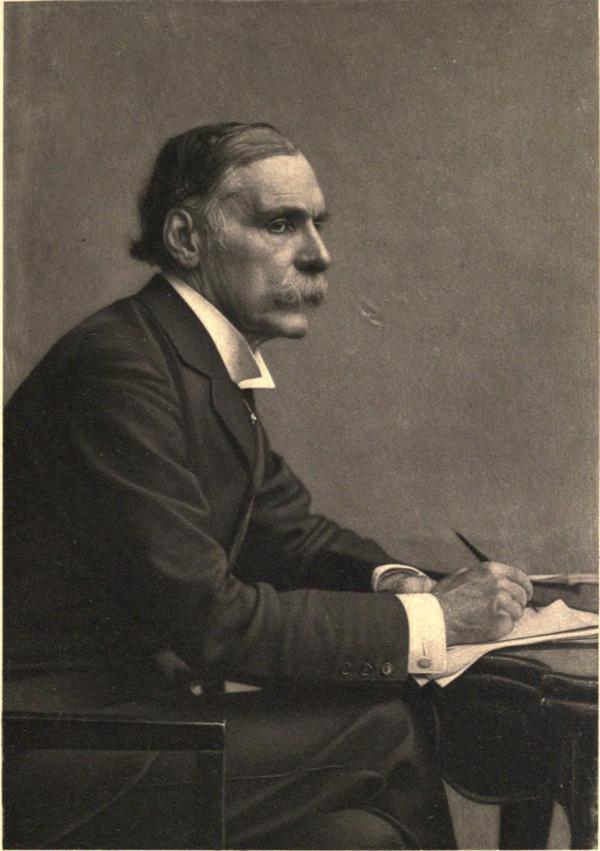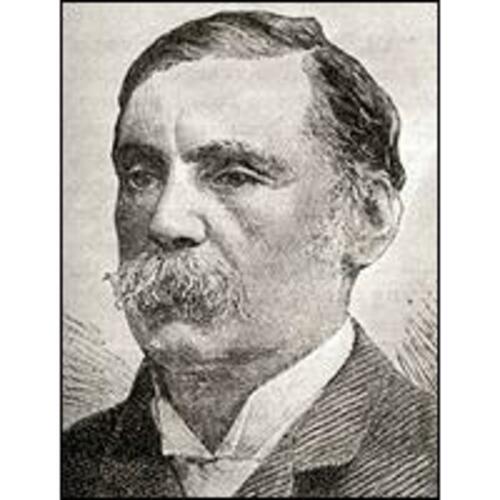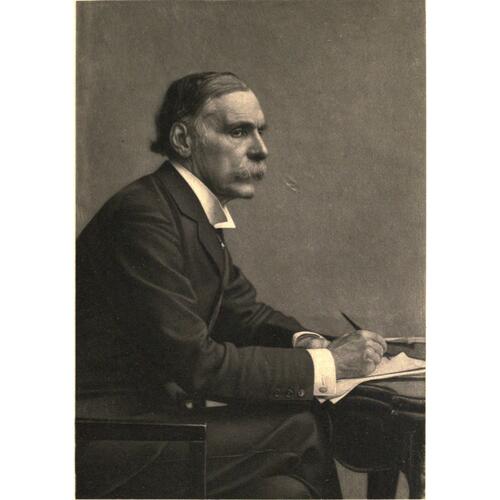
Source: Courtesy of Wikimedia Commons
DES VŒUX, Sir GEORGE WILLIAM, governor of Newfoundland; b. 22 Sept. 1834 in Baden-Baden (Germany), son of the Reverend Henry Des Vœux and Fanny Elizabeth Hutton; m. 24 July 1875 Marion Denison Pender in London, England, and they had seven children, of whom two sons and two daughters survived childhood; d. there 15 Dec. 1909.
The son of a well-connected Anglican clergyman of Huguenot descent, William Des Vœux was educated at Charterhouse in London and Balliol College, Oxford. In his third year at university, his father abruptly gave him the option of finishing his degree and becoming a clergyman or departing immediately to seek his fortune in the colonies. Having already formed the view that all religions were “more or less mistaken,” Des Vœux emigrated to Canada in 1856. He took a ba degree at the University of Toronto two years later and then studied law; he was called to the bar in 1861. Disliking routine legal work, he managed in 1863 through a friend’s influence to obtain a position as stipendiary magistrate in British Guiana. Thus began a 30-year career as a colonial official.
Des Vœux’s six years in British Guiana permanently affected his health, and he became involved in a series of disputes with the planting interest and the governor. He therefore welcomed his appointment in 1869 as administrator and colonial secretary of St Lucia. He remained attached to the government of that island until 1880, though he served as acting governor of Trinidad in 1877–78 and of Fiji in 1878–79. He accepted the governorship of the Bahamas in 1880, but he never went there, returning instead to Fiji. There he served as governor for six years, receiving a knighthood in 1883. In London early in 1886 he heard that the governorship of Newfoundland was vacant. Anxious to leave the tropics, he applied for and received the post, even though it involved a drop in salary.
Des Vœux’s appointment was not uncontroversial. The vacancy had been caused by the death the previous year of Sir John Hawley Glover*, and initially the Colonial Office had decided to replace him with Sir Ambrose Shea, a local politician who had shown considerable diplomatic skill. Shea’s appointment was fiercely opposed by many influential persons in the colony, including the premier, Robert Thorburn. Faced with their objections, the Colonial Office discarded all local candidates and appointed Des Vœux, who landed at St John’s in April to a very cool welcome from a population disappointed at Shea’s losing the position.
The new governor arrived at a difficult time. The 1885 election had been fought on sectarian lines and had roused passions and resentments that had not yet subsided. Thorburn led an exclusively Protestant government, while the opposition was exclusively Catholic. An avowed atheist, Des Vœux set about repairing the divisions in the community. He made a point of attending a different church each Sunday – historian Daniel Woodley Prowse* later remarked that the new governor’s “large unprepossessing appearance” was not welcome and that many were insulted – and used his influence and good offices to help smooth the amalgamation of the government and opposition parties in the summer of 1886. He also promoted a guarded reconciliation between Shea and Thorburn and, if his own account is to be believed, became friendly with both the Anglican and the Roman Catholic hierarchies.
Des Vœux had less success when he attempted to persuade the government to accept an Anglo-French draft convention on the French Shore, which would have allowed the French banking fleet to obtain bait on Newfoundland’s south coast. The government largely represented mercantile opinion, which was virulently anti-French and insistent that the export of bait to the French fleet should be prohibited to retaliate for France’s invasion of Newfoundland’s traditional salt-fish markets in southern Europe. In debating this matter with the ministry, Des Vœux became convinced of the strength of the colony’s case for permission to enforce an act that would control the sale of bait. He forcefully represented the ministry’s position to the Colonial Office, and it is likely that his dispatches had some impact on the imperial government, which in 1887 decided to allow the bait bill in spite of a justified fear that the French would react angrily.
His advocacy of the Newfoundland position on the bait question made Des Vœux quite popular in St John’s, and though he found the colony somewhat primitive, he enjoyed better health and good fishing. He therefore hesitated when offered the governorship of Hong Kong in the spring of 1887, but since the post represented promotion and a substantially better salary, he accepted it. Ill health forced Des Vœux to take sick leave in 1890 and to retire in 1891, resentful at the size of his pension and the lack of official appreciation for his long service. His application for a kcb was turned down in 1890 – there was “nothing exceptionally good” about his service, noted the colonial secretary, Lord Knutsford – but he was solaced with a gcmg three years later. His health was now improved, but he remained in retirement until his death in 1909, with leisure to write extensive memoirs.
Never afraid to speak his mind or to take an independent line, Des Vœux proved, in difficult circumstances, to be one of Newfoundland’s better governors. As Sir Robert Herbert of the Colonial Office wrote when Des Vœux left the colony, it was to his credit that “he has succeeded in a remarkable degree in obtaining the confidence and goodwill of ministers and people.”
[This account of Des Vœux’s life and career is derived to a large extent from his autobiography, My colonial service in British Guiana, St. Lucia, Trinidad, Fiji, Australia, Newfoundland, and Hong Kong, with interludes (2v., London, 1903). j.k.h.]
Private arch., R. E. P. Cecil, 6th Marquess of Salisbury (Hatfield, Eng.), Papers of R. A. T. Gascoyne-Cecil, 3rd Marquess of Salisbury, Knutsford to Salisbury, 22 April 1890. PRO, CO 194/209–10. DNB. Hiller, “Hist. of Nfld.” Nfld, House of Assembly, Journal, 1887, app.: 677–81, 689–99. D. W. Prowse, “My colonial service by Sir G. William Des Vœux, g.c.m.g.: a review,” Nfld Quarterly, 3 (1903–4), no.2: 11–12.
Cite This Article
J. K. Hiller, “DES VŒUX, Sir GEORGE WILLIAM,” in Dictionary of Canadian Biography, vol. 13, University of Toronto/Université Laval, 2003–, accessed May 16, 2025, https://www.biographi.ca/en/bio/des_voeux_george_william_13E.html.
The citation above shows the format for footnotes and endnotes according to the Chicago manual of style (16th edition). Information to be used in other citation formats:
| Permalink: | https://www.biographi.ca/en/bio/des_voeux_george_william_13E.html |
| Author of Article: | J. K. Hiller |
| Title of Article: | DES VŒUX, Sir GEORGE WILLIAM |
| Publication Name: | Dictionary of Canadian Biography, vol. 13 |
| Publisher: | University of Toronto/Université Laval |
| Year of revision: | 1994 |
| Access Date: | May 16, 2025 |




